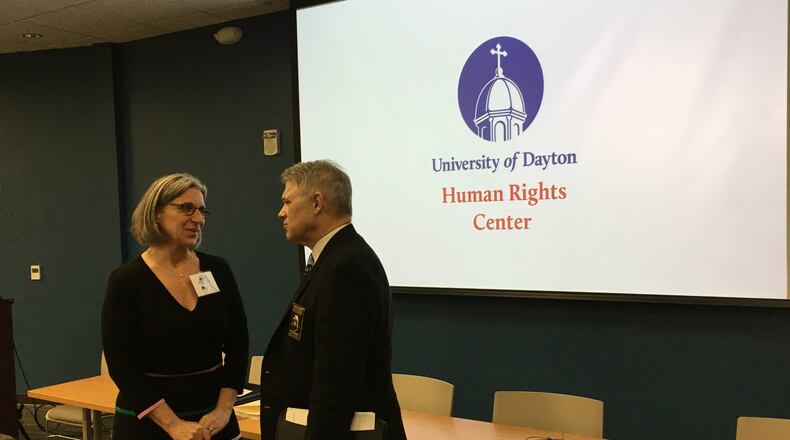Those killed were Derrick Fudge, 57; Lois Oglesby, 27; Saeed Saleh, 38; Logan Turner, 30; Nicholas Cumer, 25, Thomas McNichols, 25, Beatrice Warren-Curtis, 36 and Monica Brickhouse, 39; and Megan Betts, 22.
“It is shocking that an event that lasted less than a minute could have this kind of impact on us,” said Barbara Frey, a professor at the University of Minnesota and former United Nations Rapporeur on Human Rights and Small Arms.
Frey spoke on a panel at the event, held in the University of Dayton’s Fitz Center for Leadership in Community, located at 1401 S. Main St., and hosted by the University of Dayton Human Rights Center.
“I cannot begin to tell you the random acts of kindness that I have seen in the past six months,” said Dayton Mayor Nan Whaley. “In a strange way when these very terrible, tragic events occur a community strangely comes together in a way that you don’t anticipate and you can’t ever predict.”
Speakers commemorated the victims of the shooting and other recent episodes of gun violence, like the 22 people who were killed and others injured at the Walmart in El Paso, Texas the day before the Oregon District shooting.
Much like Dayton, Garcia said, the El Paso community pulled together to help the victims of gun violence with everything from blood donations to monetary support.
“I’m sorry for what your community has had to go through and I’m sorry for what other communities will go through in the future,” Garcia said.
MORE: 6 months after Oregon District shooting: ‘We are healing together’
The first part of the event was a panel discussion consisting of Frey, Christina Garcia, who works for the immigration advocacy organization Las Americas in El Paso, Texas; and Jeff Schmitt, a professor of law at the University of Dayton.
“I think it is really important for us to be mindful of the way we are vocal about how we feel in the political climate, because it was through that same rhetoric that somebody found the courage to come to our community and target it,” Garcia said.
Frey said there are 1 billion firearms in the world and 85% of those firearms are in civilian hands. Only 13% are owned by military and 2% are owned by law enforcement agencies. Of those 1 billion firearms around the globe, close to 400 million of them are owned by people living in the United States.
“There is significant consensus regarding this issue, beyond the U.S., for licensing and regulating guns,” Frey said. “The U.S. is an outlier on this issue.”
There were several tables set up at the event, giving Dayton residents a chance to learn about or participate in advocacy efforts in the region. A grief counselor was also present at the event on Tuesday.
Later in the day, there was a community round table with Whaley, Dayton Police Chief Richard Biehl, Ohio Sen. Peggy Lehner, Dayton Public School Board member and Dayton Human Relations Council consultant Will Smith and others.
Dion Green, whose father, Derrick Fudge, was was of the nine shot and killed on Aug. 4, also spoke at the event.
Lehner said it is frustrating to see the lack of gun safety bills moving in the Ohio Statehouse. The bills that are moving the quickest, Lehner said, are Stand Your Ground bills and bills that would expand concealed carry laws.
“This work often feels like banging your head against a wall,” Whaley said. “It’s going to take a lot of us banging our heads against the wall to get that wall to come down. It doesn’t have to be this way.”
RELATED: Dayton’s protector Jeremy Ganger — ‘Not all heroes wear capes’
About the Author

